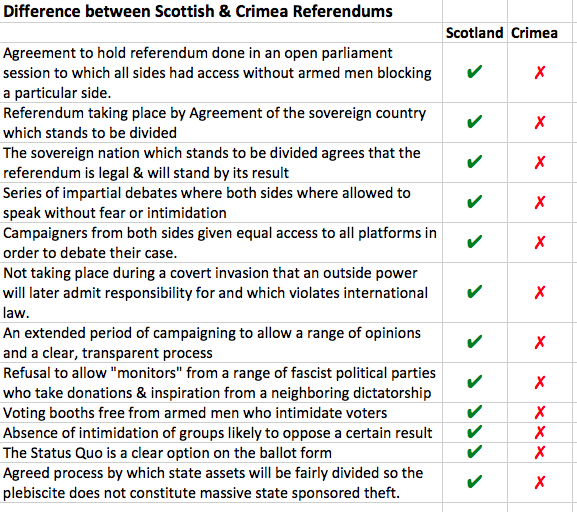To be fair, at least these folks are doing it right when compared to the most recent "referendum"
 | |
| from https://twitter.com/edwardlucas/status/510717257388130304 |
So, why I am opposed to most independent movements on democracies? Because there is another way. Sure, there are some democracies where an ethnic group is small enough to be politically irrelevant and thus dominated with no chance to affect its fortunes. But mostly, democracy means both having one's rights protected and having access to the political system. The Scots are not powerless. Much of the independence movement is mostly frustrated because of who governs the UK right now--the Conservatives. But that is temporary (unless Scotland secedes).
An essential part of democracy is that when a side loses, they accept defeat and work to come back into power some time later. Democracy will not work if losing an election or two leads to secession. Again, losing is an essential part of democracy.
Besides my general problem with secession, there are two other parts of this process that bother me.
First, what the Quebec and Scottish referendums share in common is a low threshold--50% plus one. I find this incredibly problematic. Why? Because massive political and social change should require not just a few folks more being in favor than opposed--it should have much enthusiasm that most people desire it. If 50% plus one wins the day, then a narrow majority can impose its preference on the minority in a way the minority cannot ameliorate without leaving.
Second, while the question is clear, the outcome is not because of my long stated rule #1 of secessionist movements: they downplay the costs. Because the benefits are pretty vague and not so compelling in advanced democracies (it is not about repression or freedom), pro-secession people have to downplay the costs. If there was a really compelling need to be independent, then the activists would not have to say that there would be no economic uncertainty, that their membership in international organizations was not at risk and on and on.
Secessionist efforts in advanced democracies tend have both of these problems. In places which are far less democratic, the outcome of the referendums are entirely predictable--a sweeping majority in favor due to the desire to have real self-rule instead of domination AND there is no need to underplay the costs because whatever the costs are, they are less than being dominated by another nation. Kosovo, South Sudan, East Timor are prime examples where the benefits of independence are so clear and striking that no one has to worry about 50% plus one, and the advocates did not have to worry about the "fearmongering" of the no's about membership in international organizations.
If the Scots were a smaller group, whose rights were violated, who never could exercise much political power, then it would be different. But the Scots have won most of the battles, including gaining more autonomy, which means that there is less to be gained by independence. This, in turn, means that the yeses need a low threshold and for people to ignore the costs.
No comments:
Post a Comment